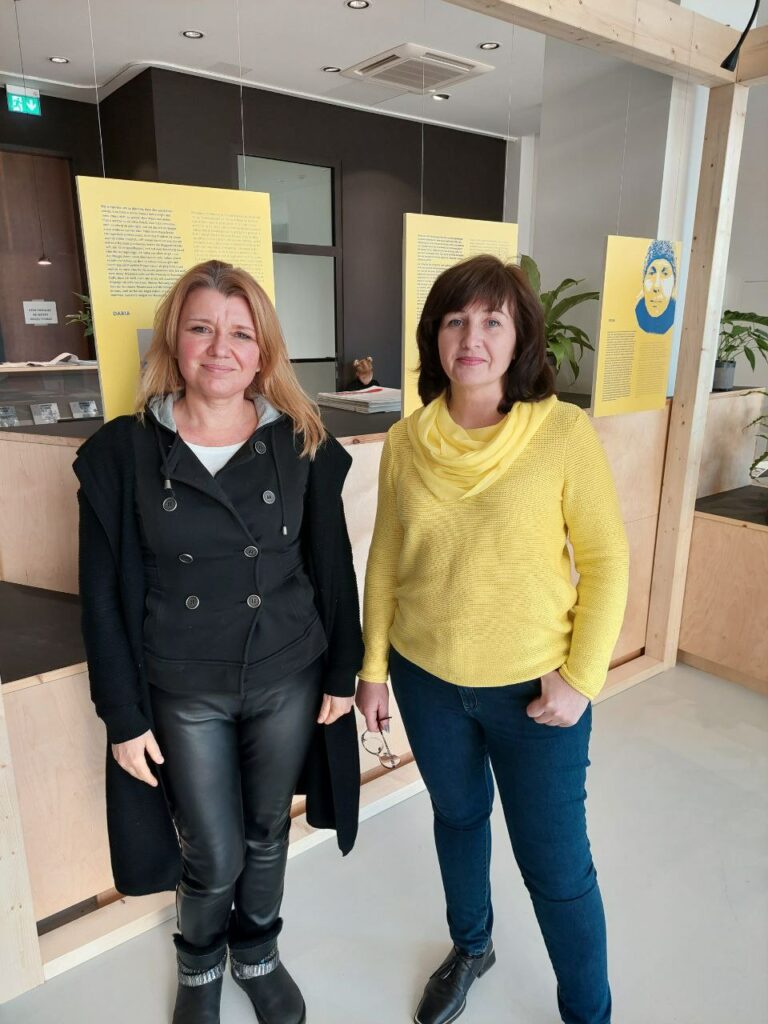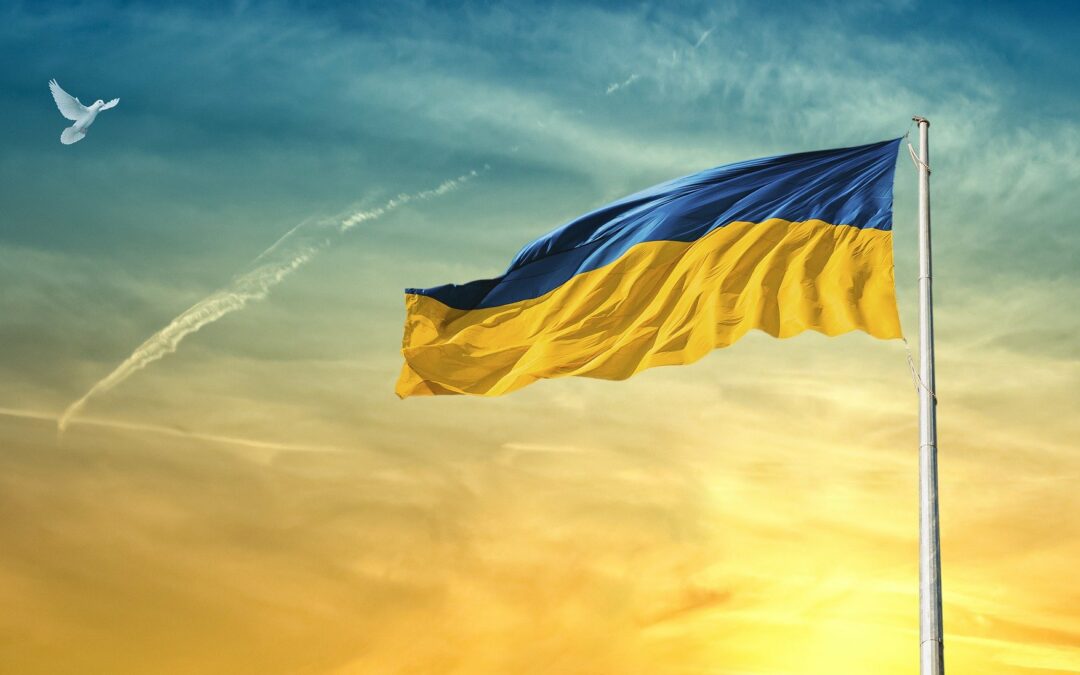Carrying museum artefacts in a suitcase and evacuating university hardware while hiding in shelters. This is the new reality for Ukrainian researchers. Elephant in the lab talked to two of them.
In light of the current war in the Ukraine we want to support Ukrainian researchers who have had to leave their homes and jobs. For this purpose, we have decided to open a telegram group and a telegram bot. We gathered all relevant information about Grants & Fellowships and Housing here and here. Also, we launched the group – here – for those who went through similar experiences. Please feel free to ask questions and share information with us that is missing from our collections via eitl@hiig.de
On February 24th Russia started a full-scale war against Ukraine. Right away many cities with thousands and millions of civilians were bombed and by now according to the UNHCR over 3,5 millions Ukrainians fled the country. Those are mostly women with children, as most men are not allowed to leave the country, they come from different areas and backgrounds. Elephant in the lab talked to two Ukrainian researchers that came to Berlin and are trying to figure out what to do next. One of them – Olena Lyniuk – who is initially from Kherson, a city that has been occupied by Russian invaders, was traveling from Kyiv to Berlin. She has a PhD in cultural studies and does research about the role of women in Ukrainian traditional culture in the Kyiv National University of Culture and Arts. For sixteen years she has been accompanying her scientific work with art projects about Ukrainian cultural traditions and ceremonies, trying to modernize old traditions. She also worked in a childrens’ theater. Ganna Nord left the city of Mykolaiv in the South of Ukraine that has been attacked almost every day since the war started. She is a professor in economics and the director of the Educational and Scientific Institute of Postgraduate Education at the Petro Mohyla Black Sea National University. Apart from that, she is also a member of the Mykolaiv city council and head of the mission on education, healthcare, social protection of youth and sports of the Mykolaiv city council.
Can you tell us what you have experienced in the last few weeks and how it has affected your work?
Olena: The last few weeks have ruined everything. It took me a lot of time to make the decision to leave and the decisive moment was when we saw lightning over our house in Kyiv and then a missile fell in the Darnitsia district – not far from where we live. After that I finally decided to leave. Half an hour after we left, shell splinters hit a building near the train station. Coming here was difficult, it took us a long time and everything was very difficult and slow both in Ukraine and abroad.
Ganna: We were leaving with our own car, so it was a bit easier. I decided to go in order to take our youngest child out of the country. This was an opportunity, because my older children were already abroad. So, I took our passports, some documents, some things we needed for a week or so and traveled to my older son. We had to drive through five countries, for some reason we were not allowed to enter Poland, so we turned back to go through Moldova, Slovakia, Hungary, Poland and then finally arrived in Germany. We came here, because we had a place to stay. I was going to leave a few days later, but then there was an explosion near my institute, and the whole staff instantly stopped working in the building and started working remotely. Those colleagues need help, which means that at the moment I’m of more use here than there. I don’t really know what’s left of our home, because a missile hit the house next to ours and our windows were knocked out.

What are the greatest challenges you have faced as a scholar so far?
Olena: The greatest challenge is actually having the ability to focus on something when your mind is in Ukraine. I’ve tried, I have some papers that are almost done and I planned to finish them here. But all you’re thinking about are the men in your family at war, and in my case even my nephew is fighting. We’re constantly in touch with them and it’s impossible to focus properly.
Ganna: It’s really hard to realize that you have a whole bunch of tasks, and it’s very difficult although possible to complete them remotely. Yesterday, we spent half a day trying to evacuate hard drives with important data from the institute, then some computers and other equipment. In general, we need to somehow organize our teaching, it is suspended until March 28, but March 28 is already on Monday and we need to continue teaching remotely in a situation, when not only students but also teachers do not have access to the resources at the institute.
I need to organize the work of our students, some of them will be graduating and no one canceled their deadlines and exams. In short, we need to prepare schedules, we need to understand in which state of mind teachers and students are right now. It’s a very complicated process, but we are working on it. Then you have to continue your own research and the work of your team, and it’s hard to get your staff together and somehow organize them when they’re under shelling and constantly hiding in shelters. Furthermore, to be useful from here, we’re sending humanitarian and military aid, so we need to make sure that our shipment arrives where it’s needed.
How can Germany help you most at the moment?
Ganna: Well, at the moment I see several possibilities. First of all, we could use support in raising additional funds to finance our research projects. Our research funding has completely stopped, we only get the base salary from the institutions, and in a situation where you cannot perform all your duties – two thirds of the salary. The basic salary is only a small part of our earnings: a professor gets, for example, 12thsnd hryvnia (around 400 Euro). Most of the actual earnings you get from extra merits, extra projects, additional lectures, research funding; this is the main part of your salary and right now it’s gone. This is why we are trying to seek additional funding for our research projects, but do not know how this is done here. For us, it would be a good way out of this situation – we could continue our research, but would not be funded through the usual Ukrainian structures that stopped working due to the war.
Second, we have our research outputs, which are of methodological nature and in order to do fundamental research we need access to hardware. For us, it would be very good if Germany gave us the opportunity to create laboratories on the territory of German universities, where it would be possible to take these research outputs with us. If such an opportunity existed, we would ship these technologies to Germany, bring our equipment and computers, we would be able to construct this equipment here, simply continue our research and present it somewhere . We work a lot with medical technologies, for example, we develop devices for children with disabilities and seniors. And here we’re partly talking about unique developments that don’t exist anywhere else, so it would be a pity if they were destroyed. And we do believe that our work could be of interest here, we already had the possibility to present it at a university here some years ago.
Third, we also need help in getting European certification, in rare cases we have already started the process, but we don’t know what to do next, how to find entrepreneurs and bring certain products to market. We are not asking for money, we are asking for an opportunity to bring our intellectual outputs to the European universities and markets.
Olena: During one of my last traineeships, we were developing art hubs at universities, nowadays creative approaches and methods are relevant for many disciplines, including technical sciences. That’s why we planned to develop these hubs in order to attract students, researchers and look for creative ways of realizing their potential. I think we could start something like this with Ukrainian art. When we arrived here in Berlin a few days ago there were already 200 thousands Ukrainians. While the war goes on and they are here, some will look for spaces where they can present their culture and identity. Maybe we’ll be able to attract some attention to Ukrainian culture, Ukrainian theater art and will get inspired by new ideas. I brought some historical artefacts – old costumes with Ukrainian embroidery that are over a hundred years old, some of them are preserved in their original form. From others we were able to save at least the motifs and transfer them onto other fabrics. We worked on these with culturologists and historians, and I took only part of them with me, the rest is back in Ukraine. It would be a tragedy to lose this work.
You mentioned that it is very important for you to get in touch with local professionals in your field. Why?
Olena: We need this communication, because if you are in a closed vacuum, you’ll never be able to develop good ideas. We need an open, decent and critical dialogue with colleagues in our field. And the German scientific and cultural environment is one of the most powerful and most interesting ones. We’d like to know more about it.
Ganna: In every process you have to look out for opportunities. In this case, our opportunity is to broaden our scope and enter the European research environment and market. In general, this would be an advantage not only for our research teams, but also for others who could work more closely in future with European universities. In some areas, Ukrainian science has findings that are not available in the EU yet; and this is a good thing. But we also have to understand that at this moment it is important for us not only to develop our areas of expertise, but simply not to lose what we have. Today it is necessary to save them. They must be saved in a safe place, and I think that Germany is the very place where Ukrainian technologies can be saved, multiplied and integrated into the European system.
Could you describe an ideal scenario of your future in Germany for the next weeks and months?
Olena: I would see myself as giving lectures or workshops in my field of study at the university. We have a cultural hub or studio, where we develop some art projects or something for children. And then, when I come back home, these bridges will already be built and we could intensify the work between our countries and universities.
Ganna: I would be happy to intensify our cooperation with German universities and startup centers, maybe even create a scientific enterprise here. Probably some areas of exchange would evolve – for German intellectual outputs in Ukraine, and Ukrainian intellectual outputs, their preservation and further development here in Germany. In addition, since we’re working in the medical field, I’m also thinking about organizing some professional traineeships for Ukrainian doctors in Germany.
An interview by Nataliia Sokolovska

